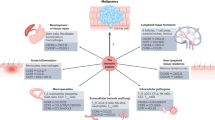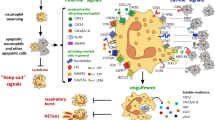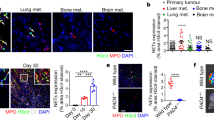Abstract
VARIOUS explanations have been given for the mechanisms of invasion in cancer1–6. Recently we have isolated a chemotactic factor specific for polymorphonuclear leucocytes (PMNs) from inflamed sites (refs. 7, 8 and M. Yoshinaga, K, Y., A. Tashiro and H. H., manuscript in preparation); it induced marked PMN emigration on experimental injection but did not increase vascular permeability. Similarities in the behaviour of tumour cells and granulocytes in inflammation suggested that a factor chemotactic for tumour cells might exist. We now report the isolation and purification of such a chemotactic substance.
This is a preview of subscription content, access via your institution
Access options
Subscribe to this journal
Receive 51 print issues and online access
$199.00 per year
only $3.90 per issue
Buy this article
- Purchase on Springer Link
- Instant access to full article PDF
Prices may be subject to local taxes which are calculated during checkout
Similar content being viewed by others
References
Hanes, F. M., and Lambert, R. R., Virchows Arch. Path. Anat., 209, 12 (1912).
Enterline, H. T., and Coman, D. R., Cancer, 3, 1033 (1950).
Hirono, I., Cancer Res., 18, 1345 (1958).
Abercrombie, M., and Ambrose, E. J., Cancer Res., 22, 525 (1962).
Wood, jun., S., Baker, R. R., Lewis, jun., R., and Marzoccki, B., in Mechanisms of Invasion in Cancer (edit. by Denoix, P.), 26 (Springer-Verlag, Berlin, 1967).
Sato, H., Trans. Soc. Pathol. Jap., 56, 9 (1967).
Hayashi, H., Trans. Soc. Pathol. Jap., 56, 37 (1967).
Yoshida, K., Yoshinaga, M., and Hayashi, H., Nature, 218, 977 (1968).
Odashima, S., J. Nat. Cancer Inst. Monograph, 16, 51 (1964).
Hayashi, H., Miyoshi, H., Nitta, R., and Udaka, K., Brit. J. Exp. Path., 43, 564 (1962).
Boyden, S., J. Exp. Med., 115, 453 (1962).
Sato, H., Belkin, M., and Essmer, E., J. Nat. Cancer Inst., 17, 1 (1956).
Goldie, H., Butler, C. H., Anderson, M. M., Maxwell, M. C., and Hahn, P. E., Cancer Res., 13, 125 (1953).
Porath, J., and Flodin, P., Nature, 183, 1657 (1959).
Van Eijk, H. G., Monfoort, C. H., Witte, J. J., and Westenbrik, H. G. K., Biochim. Biophys. Acta, 63, 536 (1962).
Jovin, T., Chrambach, A., and Naughton, M. A., Anal. Biochem., 9, 351 (1964).
Orstein, L., Ann. NY Acad. Sci., 121, 321 (1964).
Davis, B. J., Ann. NY Acad. Sci., 121, 404 (1964).
Andrews, P., Biochem. J., 96, 595 (1965).
Author information
Authors and Affiliations
Rights and permissions
About this article
Cite this article
HAYASHI, H., YOSHIDA, K., OZAKI, T. et al. Chemotactic Factor associated with Invasion of Cancer Cells. Nature 226, 174–175 (1970). https://doi.org/10.1038/226174a0
Received:
Issue Date:
DOI: https://doi.org/10.1038/226174a0
This article is cited by
-
The extracellular microscape governs mesenchymal stem cell fate
Journal of Biological Engineering (2016)
-
Change in organotropism of mouse lymphoma variants associated with selective chemotactic responsiveness to organ-derived chemoattractants
Clinical & Experimental Metastasis (1991)
-
Protein factors which regulate cell motility
In Vitro Cellular & Developmental Biology (1989)
-
Organ specificity of tumor metastasis: role of preferential adhesion, invasion and growth of malignant cells at specific secondary sites
CANCER AND METASTASIS REVIEW (1988)
Comments
By submitting a comment you agree to abide by our Terms and Community Guidelines. If you find something abusive or that does not comply with our terms or guidelines please flag it as inappropriate.



